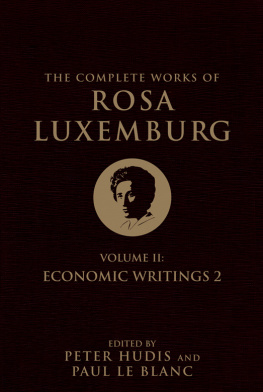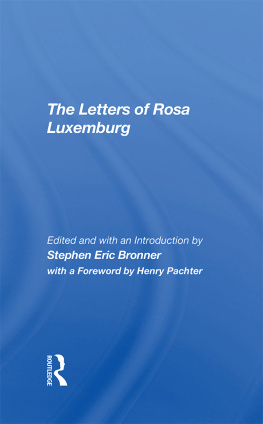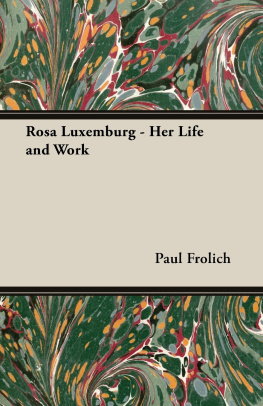Rosa Luxemburg - Reform or Revolution
Here you can read online Rosa Luxemburg - Reform or Revolution full text of the book (entire story) in english for free. Download pdf and epub, get meaning, cover and reviews about this ebook. year: 2020, genre: Politics. Description of the work, (preface) as well as reviews are available. Best literature library LitArk.com created for fans of good reading and offers a wide selection of genres:
Romance novel
Science fiction
Adventure
Detective
Science
History
Home and family
Prose
Art
Politics
Computer
Non-fiction
Religion
Business
Children
Humor
Choose a favorite category and find really read worthwhile books. Enjoy immersion in the world of imagination, feel the emotions of the characters or learn something new for yourself, make an fascinating discovery.
- Book:Reform or Revolution
- Author:
- Genre:
- Year:2020
- Rating:3 / 5
- Favourites:Add to favourites
- Your mark:
- 60
- 1
- 2
- 3
- 4
- 5
Reform or Revolution: summary, description and annotation
We offer to read an annotation, description, summary or preface (depends on what the author of the book "Reform or Revolution" wrote himself). If you haven't found the necessary information about the book — write in the comments, we will try to find it.
Reform or Revolution — read online for free the complete book (whole text) full work
Below is the text of the book, divided by pages. System saving the place of the last page read, allows you to conveniently read the book "Reform or Revolution" online for free, without having to search again every time where you left off. Put a bookmark, and you can go to the page where you finished reading at any time.
Font size:
Interval:
Bookmark:
Reform or Revolution
Rosa Luxemburg
1900
This document prepared from the text available through the Marxist Internet Archive .
Written:
1900, 1908Source:
Social Reform or Revolution , by Rosa LuxemburgPublisher:
Militant Publications, London, 1986 (no copyright)First Published:
1900 (revised second edition 1908)Translated:
IntegerOnline Version:
Rosa Luxemburg Internet Archive (marxists.org) 1999Transcription/Markup:
A. LehrerTable of Contents
Introduction
At first view the title of this work may be found surprising. Can the Social-Democracy be against reforms? Can we contrapose the social revolution, the transformation of the existing order, our final goal, to social reforms? Certainly not. The daily struggle for reforms, for the amelioration of the condition of the workers within the framework of the existing social order, and for democratic institutions, offers to the Social-Democracy an indissoluble tie. The struggle for reforms is its means; the social revolution, its aim.
It is in Eduard Bernsteins theory, presented in his articles on Problems of Socialism , Neue Zeit of 1897-98, and in his book Die Voraussetzungen des Socialismus und die Aufgaben der Sozialdemokratie that we find, for the first time, the opposition of the two factors of the labour movement. His theory tends to counsel us to renounce the social transformation, the final goal of Social-Democracy and, inversely, to make of social reforms, the means of the class struggle, its aim. Bernstein himself has very clearly and characteristically formulated this viewpoint when he wrote: The Final goal, no matter what it is, is nothing; the movement is everything.
But since the final goal of socialism constitutes the only decisive factor distinguishing the Social-Democratic movement from bourgeois democracy and from bourgeois radicalism, the only factor transforming the entire labour movement from a vain effort to repair the capitalist order into a class struggle against this order, for the suppression of this order the question: Reform or Revolution? as it is posed by Bernstein, equals for the Social-Democracy the question: To be or not to be? In the controversy with Bernstein and his followers, everybody in the Party ought to understand clearly it is not a question of this or that method of struggle, or the use of this or that set of tactics, but of the very existence of the Social-Democratic movement.
Upon a casual consideration of Bernsteins theory, this may appear like an exaggeration. Does he not continually mention the Social-Democracy and its aims? Does he not repeat again and again, in very explicit language, that he too strives toward the final goal of socialism, but in another way? Does he not stress particularly that he fully approves of the present practice of the Social-Democracy?
That is all true, to be sure. It is also true that every new movement, when it first elaborates its theory and policy, begins by finding support in the preceding movement, though it may be in direct contradiction with the latter. It begins by suiting itself to the forms found at hand and by speaking the language spoken hereto. In time the new grain breaks through the old husk. The new movement finds its forms and its own language.
To expect an opposition against scientific socialism at its very beginning, to express itself clearly, fully and to the last consequence on the subject of its real content: to expect it to deny openly and bluntly the theoretic basis of the Social-Democracy would amount to underrating the power of scientific socialism. Today he who wants to pass as a socialist, and at the same time declare war on Marxian doctrine, the most stupendous product of the human mind in the century, must begin with involuntary esteem for Marx. He must begin by acknowledging himself to be his disciple, by seeking in Marxs own teachings the points of support for an attack on the latter, while he represents this attack as a further development of Marxian doctrine. On this account, we must, unconcerned by its outer forms, pick out the sheathed kernel of Bernsteins theory. This is a matter of urgent necessity for the broad layers of the industrial proletariat in our Party.
No coarser insult, no baser aspersion, can be thrown against the workers than the remarks: Theocratic controversies are only for academicians. Some time ago Lassalle said: Only when science and the workers, these opposite poles of society, become one, will they crush in their arms of steel all obstacles to culture. The entire strength of the modern labour movement rests on theoretic knowledge.
But doubly important is this knowledge for the workers in the present case, because it is precisely they and their influence in the movement that are in the balance here. It is their skin that is being brought to market. The opportunist theory in the Party, the theory formulated by Bernstein, is nothing else than an unconscious attempt to assure predominance to the petty-bourgeois elements that have entered our Party, to change the policy and aims of our Party in their direction. The question of reform or revolution, of the final goal and the movement, is basically, in another form, but the question of the petty-bourgeois or proletarian character of the labour movement.
It is, therefore, in the interest of the proletarian mass of the Party to become acquainted, actively and in detail, with the present theoretic knowledge remains the privilege of a handful of academicians in the Party, the latter will face the danger of going astray. Only when the great mass of workers take the keen and dependable weapons of scientific socialism in their own hands, will all the petty-bourgeois inclinations, all the opportunistic currents, come to naught. The movement will then find itself on sure and firm ground. Quantity will do it.
Rosa Luxemburg
Part One
Chapter 1 The Opportunist Method
If it is true that theories are only the images of the phenomena of the exterior world in the human consciousness, it must be added, concerning Eduard Bernsteins system, that theories are sometimes inverted images. Think of a theory of instituting socialism by means of social reforms in the face of the complete stagnation of the reform movement in Germany. Think of a theory of trade union control. Consider the theory of winning a majority in Parliament, after the revision of the constitution of Saxony and in view of the most recent attempts against universal suffrage. However, the pivotal point of Bernsteins system is not located in his conception of the practical tasks of the Social-Democracy. It is found in his stand on the course of the objective development of capitalist society, which, in turn is closely bound to his conception of the practical tasks of the Social-Democracy.
According to Bernstein, a general decline of capitalism seems to be increasingly improbable because, on the one hand, capitalism shows a greater capacity of adaptation, and, on the other hand, capitalist production becomes more and more varied.
The capacity of capitalism to adapt itself, says Bernstein, is manifested first in the disappearance of general crises, resulting from the development of the credit system, employers organisations, wider means of communication and informational services. It shows itself secondly, in the tenacity of the middle classes, which hails from the growing differentiation of the branches of production and the elevation of vast layers of the proletariat to the level of the middle class. It is furthermore proved, argues Bernstein, by the amelioration of the economic and political situation of the proletariat as a result of its trade union activity.
From this theoretic stand is derived the following general conclusion about the practical work of the Social-Democracy. The latter must not direct its daily activity toward the conquest of political power, but toward the betterment of the condition of the working class, within the existing order. It must not expect to institute socialism as a result of a political and social crisis, but should build socialism by means of the progressive extension of social control and the gradual application of the principle of co-operation.
Next pageFont size:
Interval:
Bookmark:
Similar books «Reform or Revolution»
Look at similar books to Reform or Revolution. We have selected literature similar in name and meaning in the hope of providing readers with more options to find new, interesting, not yet read works.
Discussion, reviews of the book Reform or Revolution and just readers' own opinions. Leave your comments, write what you think about the work, its meaning or the main characters. Specify what exactly you liked and what you didn't like, and why you think so.















